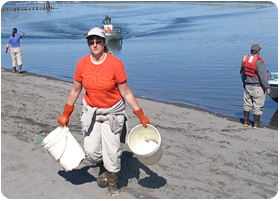2009 Ecampus Graduates
Amy Cook - Living the dream
Career Update July 2009
After completing her B.S. online in Natural Resources, Amy shares how her Ecampus degree helped her become a Fisheries Technician.
 Describe your Ecampus degree experience:
Describe your Ecampus degree experience:
My major was Natural Resources with a concentration in Fish and Wildlife. I live in Seaview, WA, a very remote little town in Southwest Washington. I chose Ecampus because when I realized it was time to finish my bachelor's degree I'd started in 1989, I could not move from my hometown and the nearest college was several hours away. I also worked full time and needed something that would work within those parameters. OSU is an incredible school and I knew that the Ecampus program would probably be top-notch as well.
Why did you choose your specific degree program?
I chose Natural Resources because I had initially gone to college to become a wildlife biologist. I knew that I would not be able to finish a biology degree online, but wanted to find a degree that would be as close to biology as possible. The Natural Resources program through OSU Ecampus has been the perfect complement. It provided an integration of science, economics, political and social disciplines that I feel has given me a very holistic approach to science and natural resource management. My career goals have always been to be able to work as a biologist, but with a degree in Natural Resources my options have increased greatly.
Describe your current job position and job search experience:
I am lucky to still be able to live and work where I have been throughout school, in Seaview, WA. I work for Pacific States Marine Fisheries Commission as a Fisheries Technician (PSMFC). I currently work at a NOAA research station in Hammond, OR (Pt. Adams Research Station). During field season I work out of Westport, OR. I love that my job provides me with field work as well as working with data in the office. I have had the opportunity to work on several projects based in our station and enjoy that I am continually learning.
The job was initially listed in our local newspaper, although I have continually kept tabs on job listing through federal state, and local agency websites. I was initially hired to work on one specific project but when funding for that project ended, I was able to be moved to another project.
How has your Ecampus degree helped you perform your job duties?
I think it was extremely valuable to be still in school when I actually started my job. This kept me aware of up-to-date issues and research surrounding natural resource management. Writing reports is a large part of my job and being in school helped me to refine my writing skills and has made writing technical reports much more enjoyable. In addition, I have found that my job may require juggling several tasks at once and being in school, working full time, as well as raising three children required that I adapt and manage my time very efficiently!
Most of my classes have contributed in some way to my job functions, but I have found that certain classes provided skills that will be valuable in any position. Rangeland Management Planning with Bob Ehrhart was one that gave insight on decision making, collaborating with people and how to bridge gaps between stakeholders. I have also found that the two GIS classes I have taken (GEO 465 and FW 303) have provided me with an introduction to GIS that my current employer and prospective employers look upon with great interest. I hope to expand on this foundation with further training in this area.
What makes you enjoy your new job?
This is a difficult question because I love all aspects of my job and the variety of activities that it entails. I get to work in the field and on boats for much of the time, and I also get to work with an extensive database, write reports and perform some data analysis. I have been able to work with great people, get exposure to fisheries research all over the Columbia River and as a contractor for NOAA, I see current and future research in the Pacific Northwest region as a whole.
What would you say to current Ecampus students who are still working toward their degrees and career goals?
My number one tip is to keep your head up and to continue to work towards the end goal; the reward is definitely worth it! I also think that it is important to remember that you are an active participant in your education. It may be easy to get complacent, but remember you are paying for your education and deserve to get the most out of it!
Back to Amy's Graduation Profile or Commencement 2009. Discover more about the Ecampus experience by reading Student Profiles.
Learn more about our online B.S. in Natural Resources.
Features and Navigation
Academic calendar
Currently it's spring term. See academic calendar for our quarter term schedule.
Summer term starts June 24.
Fall term starts Sept. 25.
Ranked top 10 in the nation

OSU Ecampus earned a top 10 ranking for the 10th year in a row on a list of America's best online bachelor's programs. Learn more »
